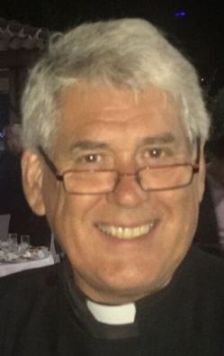 The
role of Russia in the present conflict in Syria stems from a long history of
its involvement in the region according, to a Charles Sturt University (CSU)
theologian.
The
role of Russia in the present conflict in Syria stems from a long history of
its involvement in the region according, to a Charles Sturt University (CSU)
theologian.
Dr Gregory Jenks (pictured), senior lecturer in the CSU School of Theology and the outgoing Academic Dean of St Francis' Theological College in Brisbane, argues that the actions of Russia in the Syrian civil war and the contemporary international struggle against Islamic State of Iraq and Syria (ISIS), also known as Islamic State of Iraq and the Levant (ISIL), are based on centuries of historic antecedents.
Citing many scholars and the historical record, Dr Jenks - who has just been appointed Dean of St George's College in Jerusalem - observes that, freed from its Soviet era ideologies, Russia under President Vladimir Putin is manifesting its own deeply rooted sense of itself as protector of Orthodox Christianity in the region.
"The new image of Vladimir Putin, as an Orthodox champion in the struggle against Western dominance in the region, and against ruthless Islamic extremists, resonates with historical Russian interests in the region and has strong support in the Russian homeland," Dr Jenks said.
Dr Jenks has contributed a chapter dealing with Russia and the Middle East, 'Pilgrims and Powerbrokers: The Russian Fascination with Jerusalem', for a forthcoming book. In it he catalogues the sweep of historic imperial interests that have troubled the region for millennia.
He notes that for Christians, particularly in antiquity, Jerusalem in Palestine became the centre of their world as both a location and a metaphor in world history.
Following the fall of Constantinople (now Istanbul) in the mid fifteenth century, the princes of Russia saw themselves in a new light, as preservers of 'the flame of Byzantine culture' and protectors of the Orthodox faithful living under Muslim rule from the Balkans to Jerusalem.
"Thus the Russian Empire positioned itself as the leader of an Orthodox crusade to protect the holy places and Christian (Orthodox) communities, not just from Muslims, but also from Catholics and Protestants who were increasingly influential in the Middle East during the eighteenth and nineteenth centuries," Dr Jenks said.
"One need only look at a map of the region to see the southward arc of Russian interest and influence from Moscow to Jerusalem, through Syria with its many holy sites, not least of which is Damascus, the capital of the besieged government of Bashar al-Assad."
Dr Jenks said there are real world consequences when Western foreign policy is shaped without due reference to longstanding cultural traditions, including historic Russian connections to Palestine and the wider region.
"After centuries of Russian pilgrimage to the Holy Land by the end of the nineteenth century the Russians established their own ecclesiastical mission in Jerusalem," Dr Jenks said. "In May 1882 Tsar Alexander III established the Imperial Orthodox Palestine Society, which had a key objective to promote 'Autocracy and Orthodoxy' in order to save Holy Russia. In competition with Greek Orthodoxy, one of the strategies adopted by the Russians was to promote Arab nationalism.
"There is now a large Russian immigrant population in Israel, with many former diplomats and military advisors with excellent Arabic skills and extensive networks in the region, including Sergei Stepashin, a former Russian prime minister and security-police general. Russia now also benefits from rising anti-American attitudes in the Middle East.
"Thus, politics, scriptures and religion intersect in the Middle East, and with Russia will likely remain abiding elements in the power plays of the region," Dr Jenks said.





Social
Explore the world of social